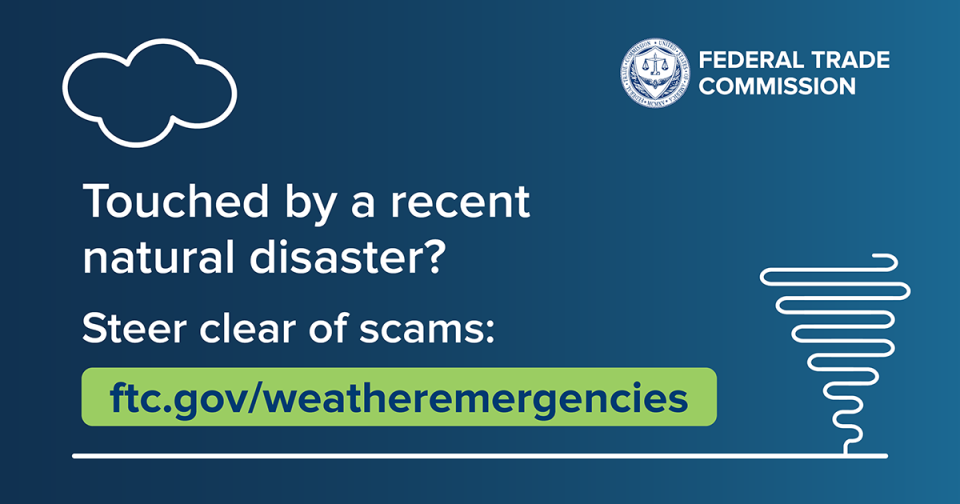As recovery efforts continue in areas hit hard by mother nature’s recent bi-coastal punch, scammers are not far behind. They see tragedy as opportunity, and they'll use the devastation caused by severe storms — like Typhoon Merbok, Hurricane Fiona, and Hurricane Ian, now headed for shore — to try to take advantage of those affected. As well as of anyone who tries to help. That's why it's so important to know how to spot the scams that often follow natural disasters.
If you suffered damage from one of the recent storms, scammers may approach you to clean up debris, pose as a government official, or offer to help you get aid for a fee. Walk away from anyone who demands personal information or money upfront. That’s always a scam. Find more on how to deal with and recover from disasters at ftc.gov/weatheremergencies.
If you want to donate to victims of the historic flooding in Alaska, or those affected by Hurricane Fiona in Puerto Rico, Bermuda and other islands in the Caribbean, here’s how to make sure your money goes to the people you want to help:
- Use these tools to research the organization before you give. Don't assume that familiar-sounding names or messages posted on social media are legitimate.
- Donate to charities you know and trust and with a proven record of dealing with disasters.
- Be cautious about giving to individuals on crowdfunding sites. It’s safest to give to someone you personally know and trust. Review the platform’s policies and procedures, not all crowdfunding sites verify postings for help after a disaster. Read Donating Through Crowdfunding, Social Media, and Fundraising Platforms.
- If someone wants donations in cash, by gift card, by wiring money or cryptocurrency, don’t do it. Pay by credit card, which offers more protections, or by check.
Learn more about how to avoid charity scams at ftc.gov/charity. And report charity or weather-related scams to the FTC: ReportFraud.ftc.gov.


It is your choice whether to submit a comment. If you do, you must create a user name, or we will not post your comment. The Federal Trade Commission Act authorizes this information collection for purposes of managing online comments. Comments and user names are part of the Federal Trade Commission’s (FTC) public records system, and user names also are part of the FTC’s computer user records system. We may routinely use these records as described in the FTC’s Privacy Act system notices. For more information on how the FTC handles information that we collect, please read our privacy policy.
The purpose of this blog and its comments section is to inform readers about Federal Trade Commission activity, and share information to help them avoid, report, and recover from fraud, scams, and bad business practices. Your thoughts, ideas, and concerns are welcome, and we encourage comments. But keep in mind, this is a moderated blog. We review all comments before they are posted, and we won’t post comments that don’t comply with our commenting policy. We expect commenters to treat each other and the blog writers with respect.
We don't edit comments to remove objectionable content, so please ensure that your comment contains none of the above. The comments posted on this blog become part of the public domain. To protect your privacy and the privacy of other people, please do not include personal information. Opinions in comments that appear in this blog belong to the individuals who expressed them. They do not belong to or represent views of the Federal Trade Commission.